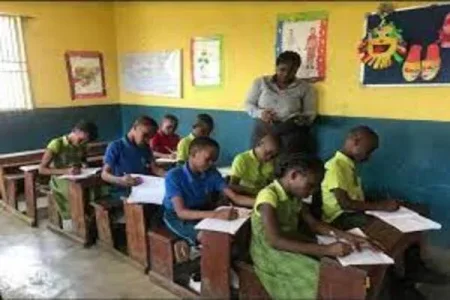
Amid Nigeria's escalating cost-of-living crisis, private schools are grappling with a severe shortage of teachers, as educators desert classrooms in protest over meager salaries. The situation, exacerbated by the economic fallout from President Bola Tinubu's reforms, has left school owners struggling to retain staff and parents anxious about the quality of education their children are receiving.
Many upcoming private schools are offering monthly salaries below N50,000 ($33), a figure well below Nigeria's minimum wage of N30,000. The economic downturn, coupled with the removal of subsidies in June 2023, has pushed ordinary Nigerians to the brink, making it challenging for families to meet basic needs.
Rasheed Babafemi, a school proprietor, finds himself caught in this educational conundrum. Excited to open his nursery and primary school, Babafemi now faces the harsh reality of the cost-of-living crisis, struggling to attract and retain qualified teachers due to inadequate pay. The impact of surging inflation has further strained his school's finances, making it difficult to sustain operations.
The ripple effect is felt in schools across the country, with teachers resigning to seek employment in factories or engage in alternative businesses that offer better financial prospects. The scarcity of teachers poses a threat to the quality of education, with some schools resorting to unconventional measures to cope.
As inflation rates reach alarming heights, families are under intense pressure, struggling to survive on dwindling incomes. The National Bureau of Statistics reports a headline inflation rate of 29.90 percent in January 2024, exacerbating the economic challenges faced by teachers and families alike.
The plight of teachers like Sandra Nwauba, a 20-year veteran earning less than $30 a month, highlights the urgency of addressing the crisis. Multiple taxation and resistance to tuition fee increases contribute to school owners' inability to pay competitive salaries, creating a vicious cycle that impacts both educators and students.
In the face of these challenges, teachers are adopting coping mechanisms, such as taking on extra tasks or engaging in additional income-generating activities. Joshua Apata and Amanda Efe share their experiences of handling home coaching classes and online sales to supplement their incomes, reflecting the resilience of educators amidst adversity.
The teacher scarcity in private schools underscores the need for comprehensive solutions to address the broader economic challenges affecting Nigeria's education sector.




